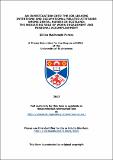Files in this item
An investigation into the job leaving intentions and occupational-related attitudes among dental nurses in Scotland : the mediating role of work engagement and personal accomplishment
Item metadata
| dc.contributor.advisor | Humphris, Gerry | |
| dc.contributor.advisor | Freeman, Ruth | |
| dc.contributor.author | Forbes, Gillian MacKenzie | |
| dc.coverage.spatial | 175 | en_US |
| dc.date.accessioned | 2013-06-04T09:49:42Z | |
| dc.date.available | 2013-06-04T09:49:42Z | |
| dc.date.issued | 2012 | |
| dc.identifier.uri | https://hdl.handle.net/10023/3600 | |
| dc.description.abstract | Background: Studies have investigated work engagement in dentistry, however dental nurse engagement is still inadequately understood. Also concerns about low retention and shortages of dental nurses in the UK have been highlighted. The purpose of this dissertation was two-fold. First is to build on the existing understanding of the mediating role of work engagement and personal accomplishment between occupational-related attitudes and leaving intentions. Secondly, to explore which of the specific occupational-related attitudes of dental nurses support and encourage a dental nursing career. Aims: The research had 3 aims. (1) To address the lack of information on work engagement among dental nurses, (2) To understand which job resources are important in the work-place and (3) to investigate how these job resources relate to work engagement and personal accomplishment and in turn their relationship with future intentions to leave the profession. Method: A sequential exploratory design of mixed methods was employed to collect data by first exploring the work experiences using focus groups of 24 dental nurses, either undergoing registration training or further post-registration qualification courses in 2 locations. Secondly, a newly designed cross-sectional questionnaire investigated demographics, job demands and resources, work engagement and personal accomplishment (using Utrecht Work Engagement Scale and the Maslach Burnout Inventory respectively) and an adapted measure of intention-to-leave of a sample of 269 dental nurses in Scotland (pre-registration n = 241; post registration n = 28). Results: A major theme was opinion surrounding the introduction of registration in August 2009. Registration for pre-registration dental nurses had a personal impact whereas post-registration dental nurses expressed a benefit for the whole profession. A common theme emerging from both groups of dental nurses was the provision of a clearer career pathway. Influences on leaving for pre-registration dental nurses were not being part of an integrated dental team and no sense of feeling valued. An uncovered underlying theme was the concept of professionalism. Pre-registration dental nurses sought support and security. This opinion contrasted with that of the post-registration group who appreciated a greater sense of independency. In the questionnaire the overall response rate was 82% based on pre-registration dental nurses only. Pre-registration dental nurses’ work engagement scores were more dedicated (p < 0.0001), and absorbed (p < 0.007) and had less vigour (p < 0.0001) when compared to UWES manual norm values. Work engagement had a mediating role between job resources and intention-to-leave. The job resources predicting higher work engagement were positive beliefs about registration, task significance and variety, and low repetition in the daily routine. Conclusion: There was some evidence that a professional process occurs during registration training which may be indicative of future intentions to remain in dental nursing. Contextual job resources were more salient in supporting work engagement. Work engagement is a key indicator of intention-to-leave whilst high personal accomplishment predicted high intention-to-leave. Also some evidence suggested job resources may act indirectly on intention-to-leave. | en_US |
| dc.language.iso | en | en_US |
| dc.publisher | University of St Andrews | |
| dc.subject.lcc | RK60.5F7 | |
| dc.subject.lcsh | Dental assistants--Scotland--Employment | en_US |
| dc.subject.lcsh | Nurses--Scotland--Employment | en_US |
| dc.subject.lcsh | Dental assistants--Job satisfaction--Scotland | en_US |
| dc.title | An investigation into the job leaving intentions and occupational-related attitudes among dental nurses in Scotland : the mediating role of work engagement and personal accomplishment | en_US |
| dc.type | Thesis | en_US |
| dc.accrualMethod | Nurses--Job satisfaction--Scotland | en_US |
| dc.type.qualificationlevel | Doctoral | en_US |
| dc.type.qualificationname | MPhil Master of Philosophy | en_US |
| dc.publisher.institution | The University of St Andrews | en_US |
| dc.publisher.department | University of Dundee (Social Dimensions of Health Institute) | en_US |
This item appears in the following Collection(s)
Items in the St Andrews Research Repository are protected by copyright, with all rights reserved, unless otherwise indicated.

